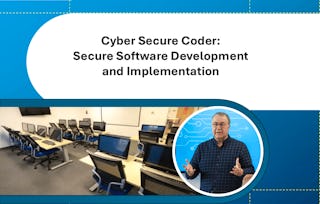This course introduces you to the principles of secure programming. It begins by discussing the philosophy and principles of secure programming, and then presenting robust programming and the relationship between it and secure programming. We'll go through a detailed example of writing robust code and we'll see many common programming problems and show their connection to writing robust, secure programs in general. We’ll examine eight design principles that govern secure coding and how to apply them to your own work. We’ll discuss how poor design choices drive implementation in coding. We’ll differentiate between informal, formal, and ad hoc coding methods. Throughout, methods for improving the security and robustness of your programs will be emphasized and you will have an opportunity to practice these concepts through various lab activities. A knowledge of the C programming language is helpful, but not required to participate in the lab exercises.

Principles of Secure Coding

Principles of Secure Coding
This course is part of Secure Coding Practices Specialization

Instructor: Matthew Bishop, PhD
23,878 already enrolled
Included with
377 reviews
Recommended experience
Skills you'll gain
Details to know

Add to your LinkedIn profile
8 assignments
See how employees at top companies are mastering in-demand skills

Build your subject-matter expertise
- Learn new concepts from industry experts
- Gain a foundational understanding of a subject or tool
- Develop job-relevant skills with hands-on projects
- Earn a shareable career certificate

There are 4 modules in this course
In this module, you'll be able to describe key concepts in secure programming including typical problems and procedures. You'll be able to differentiate between robust programming and secure programming and you'll generalize from philosophies of "what to watch out for" and "where to look" to specific situations.
What's included
10 videos1 reading2 assignments1 discussion prompt
In this module, you will be able to recall eight software design principles that govern secure programming. You will write a short program, in any language you like, to determine whether the system enforces the Principle of Complete Mediation. You'll be able to apply design principles from Saltzer, Schroeder and Kaashoek to code situations.
What's included
11 videos1 reading2 assignments1 discussion prompt
In this module, you will be able to explain the issues that can arise from fragile programming. You'll be able to discuss how design issues drive implementation and be able to distinguish between robust and fragile code. You'll be able to explain what can go wrong in fragile code and be able to write a robust version of fragile code.
What's included
9 videos2 readings2 assignments1 discussion prompt
In this module, you will be able to describe how to use techniques that mimic formal methods to improve the robustness and security of programs. You will also be able to compare and contrast formal, informal, and ad hoc programming methods. You'll be able to write a program to demonstrate how a poorly-written program or library can cause incorrect results.
What's included
9 videos1 reading2 assignments2 discussion prompts
Earn a career certificate
Add this credential to your LinkedIn profile, resume, or CV. Share it on social media and in your performance review.
Instructor

Offered by
Explore more from Computer Security and Networks
 Status: Free Trial
Status: Free TrialUniversity of California, Davis
 Status: Preview
Status: Preview Status: Free Trial
Status: Free TrialUniversity of California, Davis
 Status: Free Trial
Status: Free Trial
Why people choose Coursera for their career

Felipe M.

Jennifer J.

Larry W.

Chaitanya A.
Learner reviews
- 5 stars
60.31%
- 4 stars
25.92%
- 3 stars
8.73%
- 2 stars
3.17%
- 1 star
1.85%
Showing 3 of 377
Reviewed on Nov 9, 2020
its very good course but some time listening video and watching video slide, little bit confused either should we read slide or listen
Reviewed on Aug 2, 2020
Good introductory course for those who are not familiar with secure coding
Reviewed on Jan 16, 2022
This course will be very useful for me to develop program which is robust and secure also.

Open new doors with Coursera Plus
Unlimited access to 10,000+ world-class courses, hands-on projects, and job-ready certificate programs - all included in your subscription
Advance your career with an online degree
Earn a degree from world-class universities - 100% online
Join over 3,400 global companies that choose Coursera for Business
Upskill your employees to excel in the digital economy
Frequently asked questions
To access the course materials, assignments and to earn a Certificate, you will need to purchase the Certificate experience when you enroll in a course. You can try a Free Trial instead, or apply for Financial Aid. The course may offer 'Full Course, No Certificate' instead. This option lets you see all course materials, submit required assessments, and get a final grade. This also means that you will not be able to purchase a Certificate experience.
When you enroll in the course, you get access to all of the courses in the Specialization, and you earn a certificate when you complete the work. Your electronic Certificate will be added to your Accomplishments page - from there, you can print your Certificate or add it to your LinkedIn profile.
Yes. In select learning programs, you can apply for financial aid or a scholarship if you can’t afford the enrollment fee. If fin aid or scholarship is available for your learning program selection, you’ll find a link to apply on the description page.
More questions
Financial aid available,

